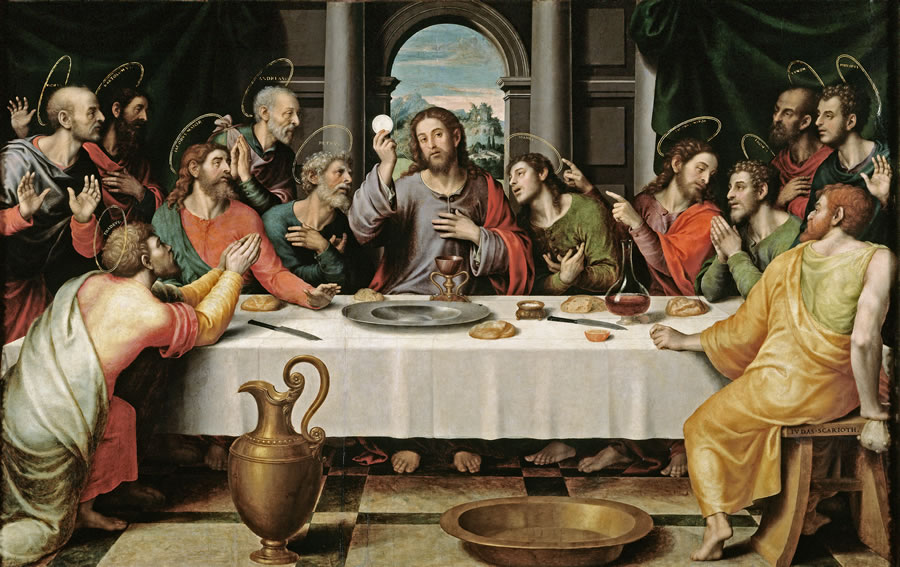
The Most Holy Body & Blood of Christ
by Fr. Madison Hayes | 06/02/2024 | Weekly ReflectionAs we gather today to celebrate the solemnity of Corpus Christi, the Most Holy Body and Blood of Christ, the readings offer a profound backdrop to the significance of this liturgical feast. The primitive scene from the Book of Exodus paints a vivid picture of a rough-hewn altar, twelve stone pillars, and young men from the tribes of Israel sacrificing young bulls. The sacrificial scene becomes a tangible prefiguration of the Eucharist.
The burnt offerings symbolize Christ’s voluntary surrender to the Father’s will on the Cross. Christ’s sacrifice, like the burnt offerings, ascends to God as a sweet savor. Our liturgy today is imbued with this sweet savor as we partake in the Eucharist, immersing ourselves in the grace emanating from Christ’s self-offering. The peace offering in the Old Testament, signifying communion with God, likewise finds its fulfillment in the Eucharist, where believers experience real Peace and Communion with God. The Eucharist bestows upon us the peace that flows from charity.
Despite any squeamishness one might feel about the imagery of blood, Catholics, accepting Jesus’ invitation to partake in His body and blood, find reason for praise. The real presence of Jesus — Body, Blood, Soul, and Divinity – in the Eucharist is a source of joy and vocal praise, reminiscent of the disciples who sang a hymn before going to the Mount of Olives.
God, in His infinite wisdom, employs our sense experience of the Eucharist to communicate the spiritual nourishment and sweetness of His grace. Though hidden beneath the signs of bread and wine, we, as Christians, perceive the profound reality that “blood is poured, and flesh is broken.” The sacrificial system of the old covenant, with its numerous offerings, served as a shadow, incapable of removing the world’s sins. However, the blood of Christ, as the Letter to the Hebrews asserts, cleanses our consciences and enables us to worship the living God.
The old covenant’s sacrificial rituals, such as the sprinkling of blood on the people, find their ultimate fulfillment in the new covenant sealed by Christ’s own blood. This blood, poured out for many for the forgiveness of sins, resonates with Christ’s words during the Last Supper, “This is my blood of the covenant, which will be shed for many.” The Church, in hearing the word of God proclaimed today, is reminded of being a new people, where the covenant of the past is perfected and fulfilled in Christ.
Christ, having entered the sanctuary with His own blood, obtains eternal redemption, marking a decisive departure from the old covenant’s rituals involving the blood of goats and calves. Through the proclamation of Christ’s paschal mystery in Sacred Scriptures and its present manifestation in the sacrifice of the Mass, the Church becomes the custodian of the New Covenant. As Christ’s faithful, we receive and respond to the word of His covenant, nourishing our faith, making us holy, and uniting us by charity.
This transmission of the divine covenant nourishes us, enabling us to Passover to heavenly realities and anticipate the promised eternal inheritance. Our reception of the precious Body and Blood of Jesus becomes a foreshadowing of the joy that awaits us in eternity. It is a joy rooted in the vision of the Trinity, the clarity of conscience, and communion with the Church Triumphant — a joy that is immortal and incorruptible.
As we partake in this Eucharistic celebration, we reflect on the depth of the mystery we encounter — the Most Holy Body and Blood of Christ — and pray that we may, for all eternity, delight in the divine life promised to us through this sacrament. May our communion today be a foretaste of the everlasting joy that awaits us in the presence of the Triune God.
BACK TO LIST BACK